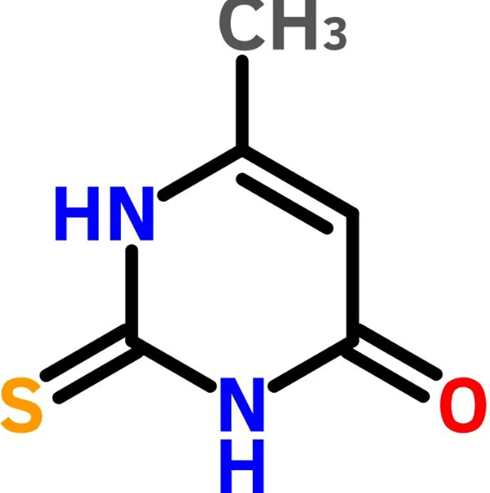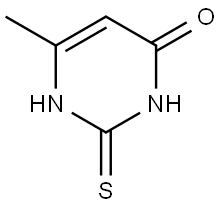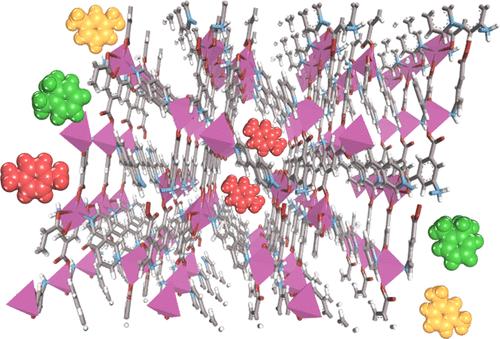Methylthiouracil: Anti-inflammatory Properties and Determination by Electrochemical Sensor
Methylthiouracil is a thioamide, closely related to propylthiouracil. It is not used clinically in the United States, it has a similar mechanism of action and side effect to that of propylthiouricil. The drug acts to decrease the formation of stored thyroid hormone, as thyroglobulin in the thyroid gland.

Anti-inflammatory Properties
The anti-inflammatory activities of methylthiouracil (MTU) were determined by measuring permeability, human neutrophil adhesion and migration, and activation of pro-inflammatory proteins in LPS-activated human umbilical vein endothelial cells and mice.We found that post-treatment with methylthiouracil (MTU) inhibited LPS-induced barrier disruption, expression of cell adhesion molecules (CAMs), and adhesion/transendothelial migration of human neutrophils to human endothelial cells. MTU induced potent inhibition of LPS-induced endothelial cell protein C receptor (EPCR) shedding. It also suppressed LPS-induced hyperpermeability and neutrophil migration in vivo. Furthermore, MTU suppressed the production of tumor necrosis factor-α (TNF-α) and interleukin (IL)-6, and the activation of nuclear factor-κB (NF-κB) and extracellular regulated kinases (ERK) 1/2 by LPS. Moreover, post-treatment with MTU resulted in reduced LPS-induced lethal endotoxemia. These results suggest that MTU exerts anti-inflammatory effects by inhibiting hyperpermeability, expression of CAMs, and adhesion and migration of leukocytes, thereby endorsing its usefulness as a therapy for vascular inflammatory diseases.1
Electrochemical Sensor Development for Methylthiouracil
The determination of Methylthiouracil has seen significant advancements through the use of electrochemical sensors, specifically voltammetric and amperometric techniques. These miniaturized sensors have been optimized for the analysis of Methylthiouracil in various meat samples, including beef liver and foie. A systematic multivariate approach was employed to optimize the extraction and detection processes. The sensors operate effectively at a working potential of 1.55 V (vs Ag pseudo-reference electrode), providing a linear response within the concentration range of 0 to 20 µg L−1 for Methylthiouracil. With a remarkably low empirical limit of detection of 0.13 µg L−1, these methods surpass legal requirements.2
References:
[1] GAHEE MIN. Suppressive effects of methylthiouracil on polyphosphate-mediated vascular inflammatory responses[J]. JOURNAL OF CELLULAR AND MOLECULAR MEDICINE, 2016, 20 12: 2221-2413. DOI:10.1111/jcmm.12925.[2] ANDREA MARCO. Electrochemical Sensor for the Determination of Methylthiouracil in Meat Samples.[J]. Sensors, 2022, 22 22. DOI:10.3390/s22228842.
See also
Lastest Price from Methylthiouracil manufacturers

US $10.00/KG2025-04-21
- CAS:
- 56-04-2
- Min. Order:
- 1KG
- Purity:
- 99%
- Supply Ability:
- 100 mt

US $556.00/KG2024-06-13
- CAS:
- 56-04-2
- Min. Order:
- 1KG
- Purity:
- 98.0%
- Supply Ability:
- 1T


